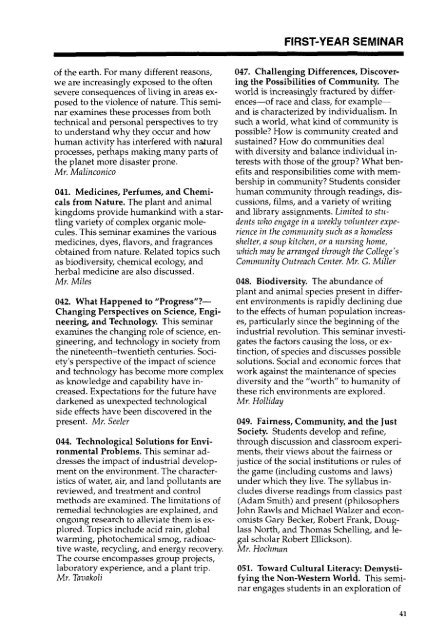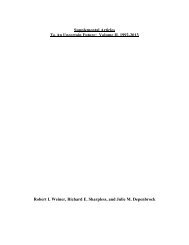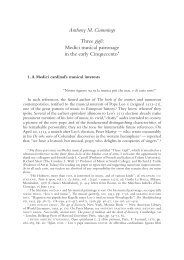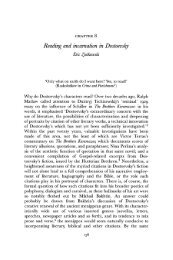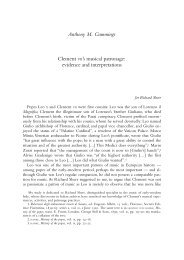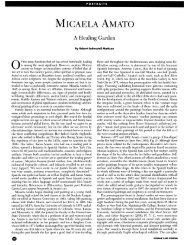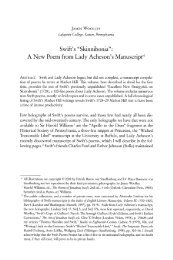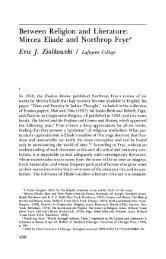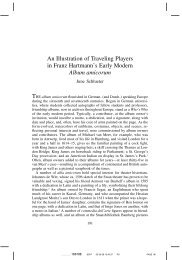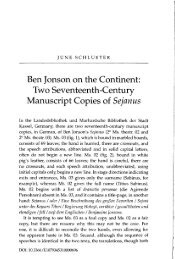courses of instruction - Lafayette College
courses of instruction - Lafayette College
courses of instruction - Lafayette College
You also want an ePaper? Increase the reach of your titles
YUMPU automatically turns print PDFs into web optimized ePapers that Google loves.
<strong>of</strong> the earth. For many different reasons,<br />
we are increasingly exposed to the <strong>of</strong>ten<br />
severe consequences <strong>of</strong> living in areas ex<br />
posed to the violence <strong>of</strong> nature. This semi<br />
nar examines these processes from both<br />
technical and personal perspectives to try<br />
to understand why they occur and how<br />
human activity has interfered with natural<br />
processes, perhaps making many parts <strong>of</strong><br />
the planet more disaster prone.<br />
Mr. Malinconico<br />
041. Medicines, Perfumes, and Chemi<br />
cals from Nature. The plant and animal<br />
kingdoms provide humankind with a star<br />
tling variety <strong>of</strong> complex organic mole<br />
cules. This seminar examines the various<br />
medicines, dyes, flavors,, and fragrances<br />
obtained from nature. Related topics such<br />
as biodiversity, chemical ecology, and<br />
herbal medicine are also discussed.<br />
Mr. Miles<br />
042. What Happened to "Progress"?<br />
Changing Perspectives on Science, Engi<br />
neering, and Technology. This seminar<br />
examines the changing role <strong>of</strong> science, en<br />
gineering, and technology in society from<br />
the nineteenth-twentieth centuries. Soci<br />
ety's perspective <strong>of</strong> the impact <strong>of</strong> science<br />
and technology has become more complex<br />
as knowledge and capability have in<br />
creased. Expectations for the future have<br />
darkened as unexpected technological<br />
side effects have been discovered in the<br />
present. Mr. Seeler<br />
044. Technological Solutions for Envi<br />
ronmental Problems. This seminar ad<br />
dresses the impact <strong>of</strong> industrial develop<br />
ment on the environment. The character<br />
istics <strong>of</strong> water, air, and land pollutants are<br />
reviewed, and treatment and control<br />
methods are examined. The limitations <strong>of</strong><br />
remedial technologies are explained, and<br />
ongoing research to alleviate them is ex<br />
plored. Topics include acid rain, global<br />
warming, photochemical smog, radioac<br />
tive waste, recycling, and energy recovery.<br />
The course encompasses group projects,<br />
laboratory experience, and a plant trip.<br />
Mr. Tavakoli<br />
FIRST-YEAR SEMINAR<br />
047. Challenging Differences, Discover<br />
ing the Possibilities <strong>of</strong> Community. The<br />
world is increasingly fractured by differ<br />
ences <strong>of</strong> race and class, for example<br />
and is characterized by individualism. In<br />
such a world, what kind <strong>of</strong> community is<br />
possible? How is community created and<br />
sustained? How do communities deal<br />
with diversity and balance individual in<br />
terests with those <strong>of</strong> the group? What ben<br />
efits and responsibilities come with mem<br />
bership in community? Students consider<br />
human community through readings, dis<br />
cussions, films, and a variety <strong>of</strong> writing<br />
and library assignments. Limited to stu<br />
dents who engage in a weekly volunteer expe<br />
rience in the community such as a homeless<br />
shelter, a soup kitchen, or a nursing home,<br />
which may be arranged through the <strong>College</strong>'s<br />
Community Outreach Center. Mr. G. Miller<br />
048. Biodiversity. The abundance <strong>of</strong><br />
plant and animal species present in differ<br />
ent environments is rapidly declining due<br />
to the effects <strong>of</strong> human population increas<br />
es, particularly since the beginning <strong>of</strong> the<br />
industrial revolution. This seminar investi<br />
gates the factors causing the loss, or ex<br />
tinction, <strong>of</strong> species and discusses possible<br />
solutions. Social and economic forces that<br />
work against the maintenance <strong>of</strong> species<br />
diversity and the "worth" to humanity <strong>of</strong><br />
these rich environments are explored.<br />
Mr. Holliday<br />
049. Fairness, Community, and the Just<br />
Society. Students develop and refine,<br />
through discussion and classroom experi<br />
ments, their views about the fairness or<br />
justice <strong>of</strong> the social institutions or rules <strong>of</strong><br />
the game (including customs and laws)<br />
under which they live. The syllabus in<br />
cludes diverse readings from classics past<br />
(Adam Smith) and present (philosophers<br />
John Rawls and Michael Walzer and econ<br />
omists Gary Becker, Robert Frank, Doug-<br />
lass North, and Thomas Schelling, and le<br />
gal scholar Robert Ellickson).<br />
Mr. Hochman<br />
051. Toward Cultural Literacy: Demysti<br />
fying the Non-Western World. This semi<br />
nar engages students in an exploration <strong>of</strong><br />
41


